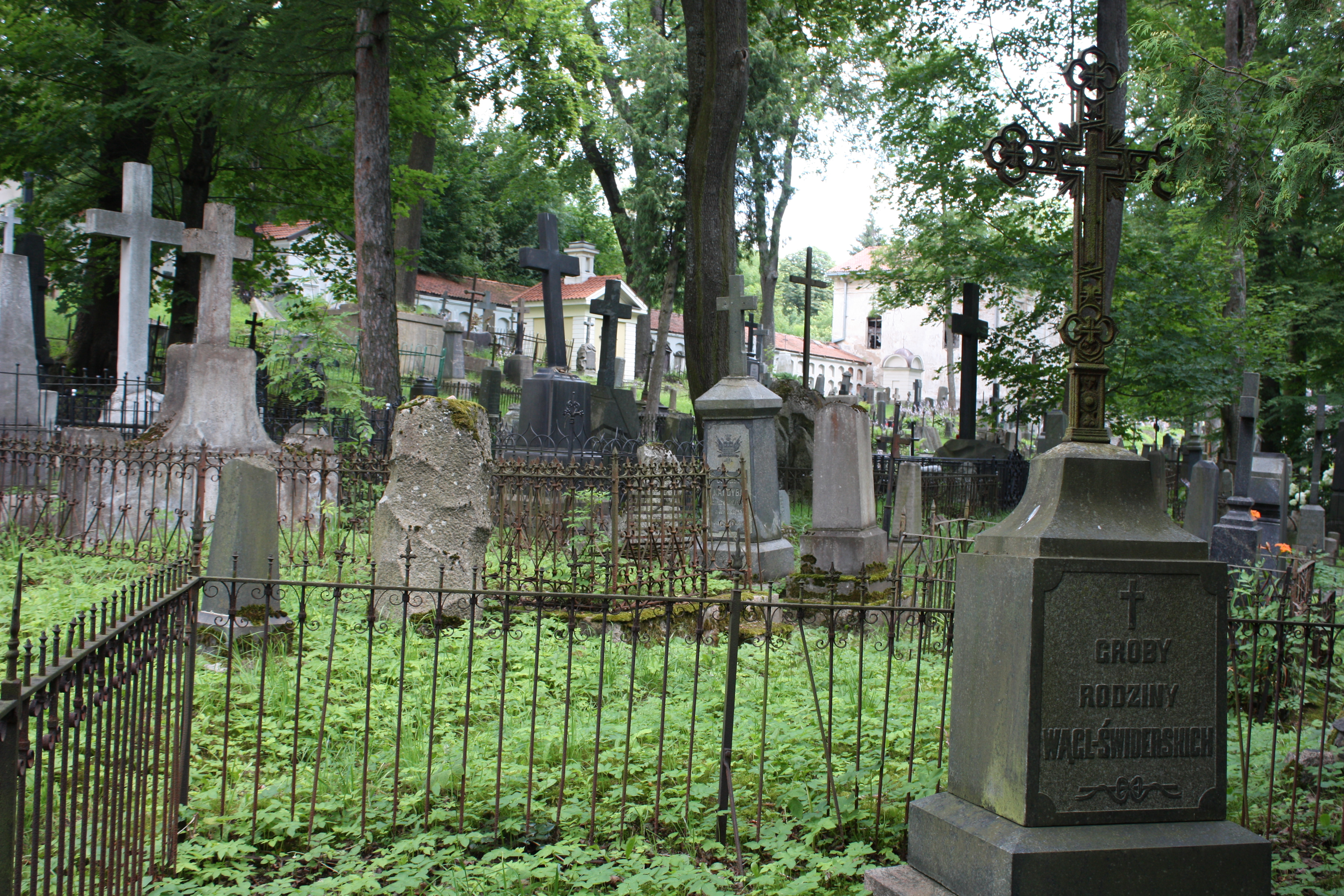You have /5 articles left.
Sign up for a free account or log in.
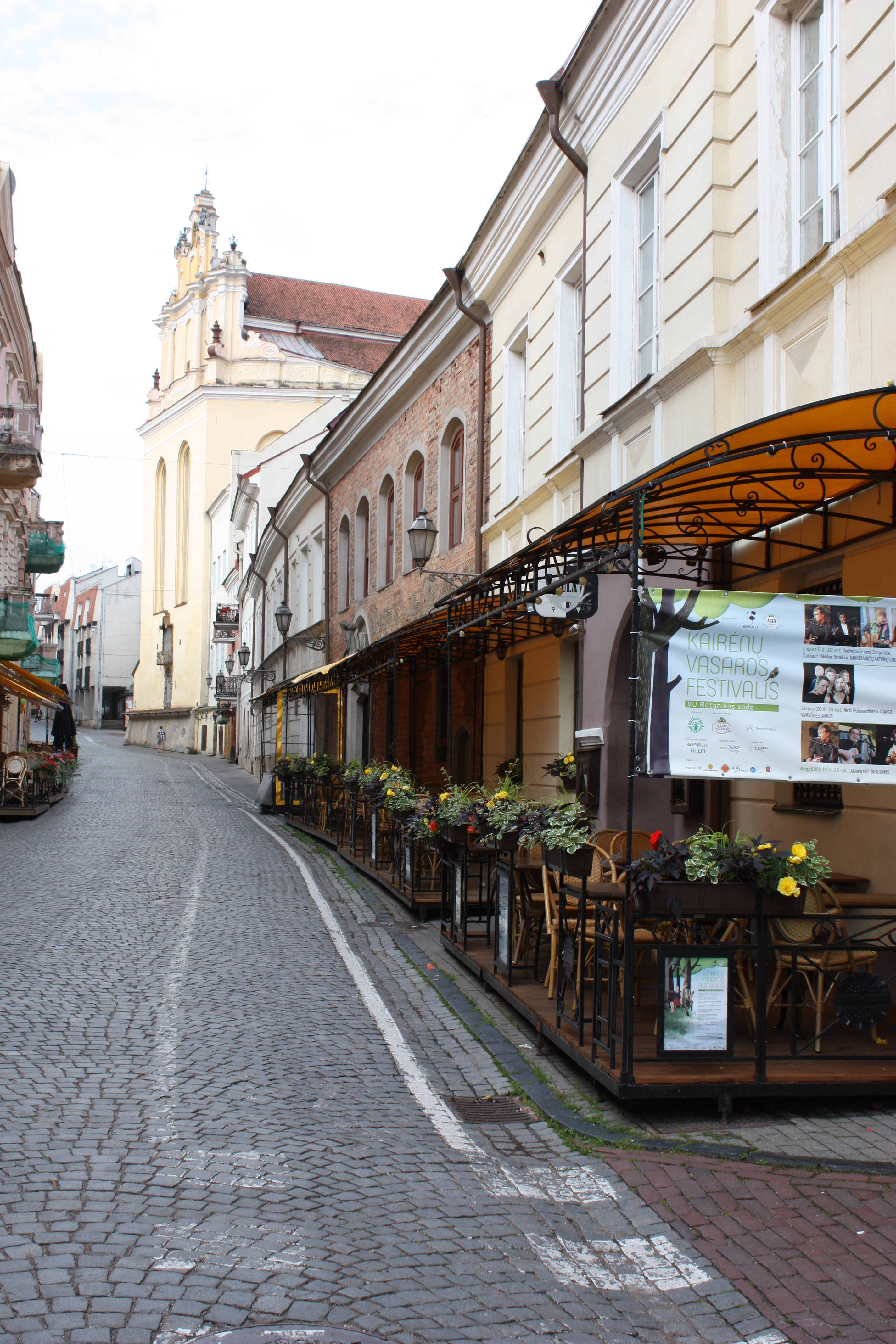 Here in the Old Town of Vilnius, Lithuania, it’s just about heaven, at times: Six a.m., as the woman in the orange vest sweeps trash with a broom and a little dustpan from the length of cobblestoned Pilies Street, and not another soul out. A couple of hours later, when Lithuanians walk briskly downhill toward the offices and businesses near the Cathedral and up Gedimino Street; the women are often six-feet tall with high-fashion beauty and stride along, in sundresses and sheer, multilayered things that look cool and stylish, with Audrey Hepburn insouciance. Because many cafes don’t open until nine a.m. or even ten, my friend Frenchy and I wander profitably before sitting down to work and coffee.
Here in the Old Town of Vilnius, Lithuania, it’s just about heaven, at times: Six a.m., as the woman in the orange vest sweeps trash with a broom and a little dustpan from the length of cobblestoned Pilies Street, and not another soul out. A couple of hours later, when Lithuanians walk briskly downhill toward the offices and businesses near the Cathedral and up Gedimino Street; the women are often six-feet tall with high-fashion beauty and stride along, in sundresses and sheer, multilayered things that look cool and stylish, with Audrey Hepburn insouciance. Because many cafes don’t open until nine a.m. or even ten, my friend Frenchy and I wander profitably before sitting down to work and coffee.
Near-heaven at lunch—a perfect bowl of carrot-and-chicken soup with herbs and pepper—with locals at sidewalk tables under bright Kalnapilis and Svyturys beer umbrellas. In the parks the beds of roses and begonias are meticulously cleaned with rakes and hand brushes instead of two-cycle leaf-blowers and electric hedge-trimmers, and outside the national archaeological museum a lady of retirement age, with gold earrings and hairdo tight from a recent visit to the salon, rakes and bags leaves on the enormous lawn. The sun doesn’t set now until just before midnight, and in the twilight families walk with small children riding their little pushbikes, often made of wood. Lights come on, musicians play in the ancient streets, and people enjoy long slow dinners.
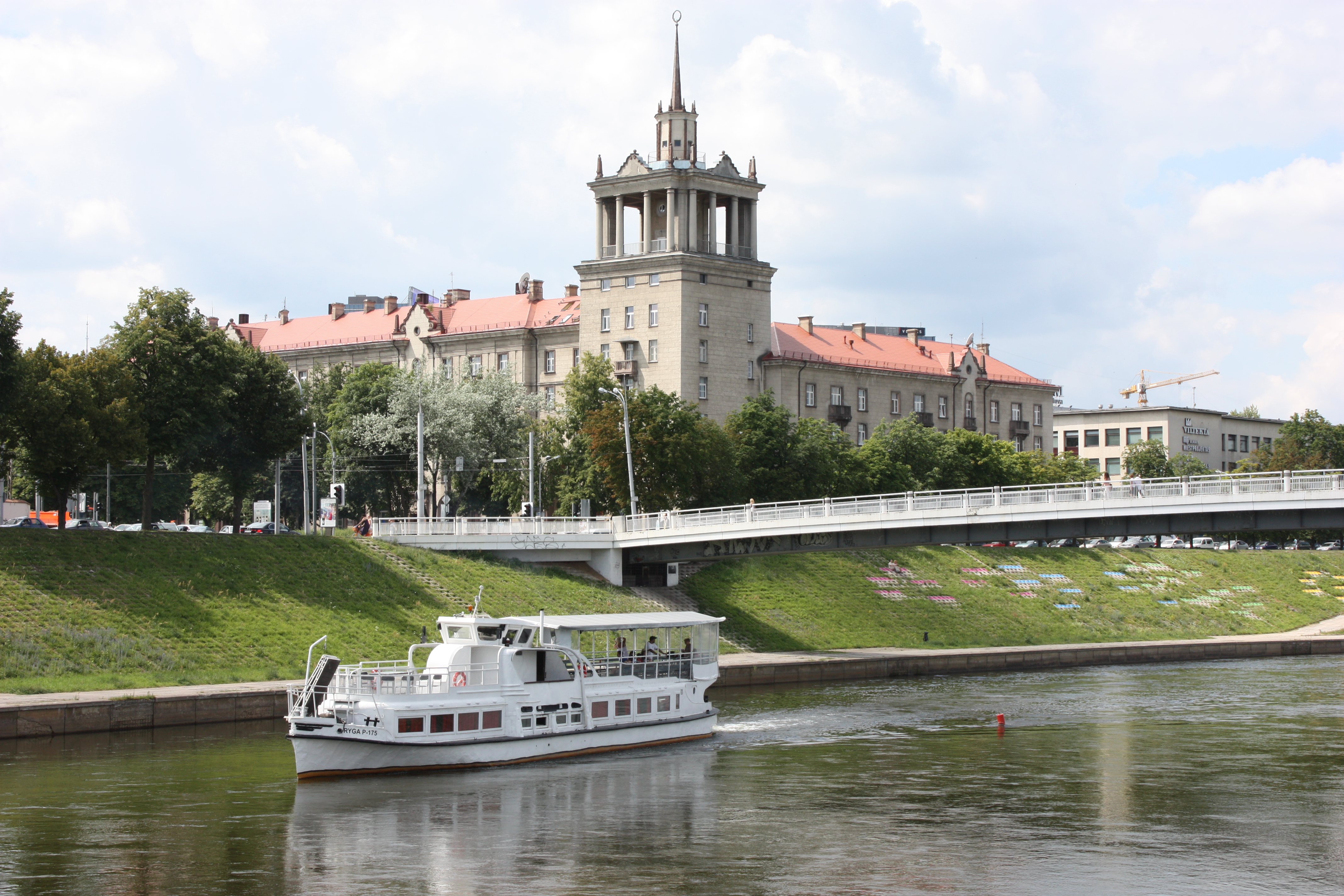
There is something in coming to Vilnius that web surfing will never give, always will be, but now it’s a Destination because it’s still a Place. And at the appointed times tour groups from the U.S., Japan, Italy, Germany, and elsewhere are led in waves of sore-footed charges down Pilies Street by group leaders waving company guidons and pointing out the dozenth amber or linen shop in which to find plunder. Disaffected international teens lag behind the rest of their sunburned families; the college-aged show off fraternal shirts and ball caps, piercings and punk haircuts, guitars and harmonicas, and all look each other over hungrily for signs of possible hookup, booze, drugs. We all weave through the mutual crowd, the rented Segways, rented bicycles, commuter bicycles, delivery vans, and the creeping sedans of residents who’ve had the financial windfall and domestic disaster of living above the main tourist street in a European Capital of Culture.
There’s the rattle, clatter, and whoosh of bricks, stucco, and trash pouring down chutes from renovation projects all over the city. At night, city buses, tour buses, garbage trucks, lorries, and Harley Davidsons roar past our hostel, setting off car alarms in the dozens of Mercedes and other expensive imports at the curbs. A tattooed Latvian shouts angrily in Russian over his phone outside the door of our room, and in the morning pigeons peck at vomit on the steps of the highest-recommended “traditional Lithuanian” restaurant in town, which specializes in starchy, wet potato dumplings called zeppelins, but where I had potato pudding with pigs’ ears.
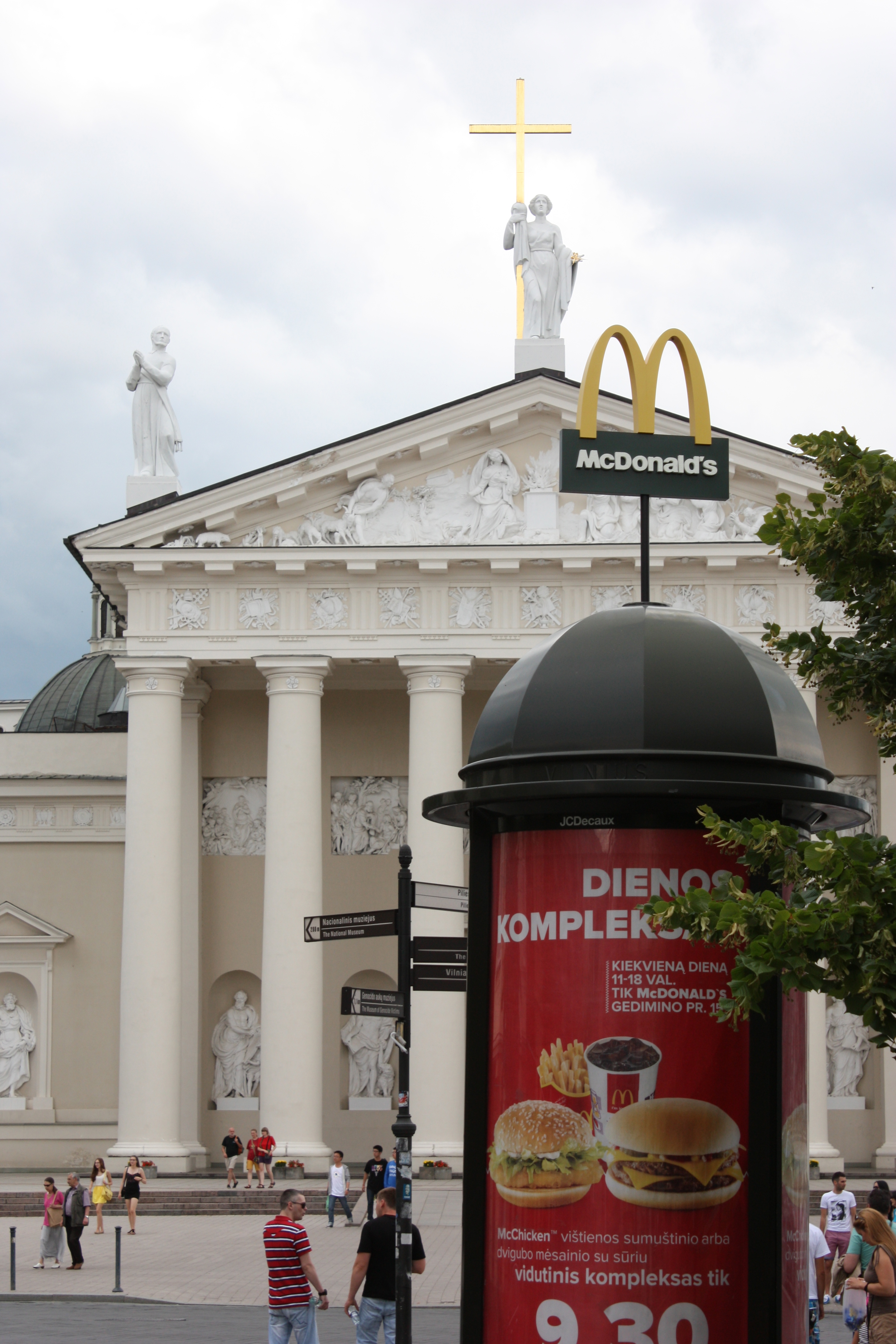 There are no Starbucks, thankfully, but there is a McDonald’s and at least one KFC, not to mention shops for Henckel knives, Versace, Gucci, Michael Kors, and Coach. At least the Vilnans(?) have an excellent sense of humor about it: The shopping mall is in the massive building that was Central Headquarters of the Lithuanian Communist Party.
There are no Starbucks, thankfully, but there is a McDonald’s and at least one KFC, not to mention shops for Henckel knives, Versace, Gucci, Michael Kors, and Coach. At least the Vilnans(?) have an excellent sense of humor about it: The shopping mall is in the massive building that was Central Headquarters of the Lithuanian Communist Party.
The country has long been beset by the shits of Europe, of course, which is why things are still in transition. Nazis murdered a quarter-million Jews in Lithuania, leaving only a couple thousand in the Vilnius ghettoes, and the Soviets killed or sent Lithuanians to gulags in Russia by the tens of thousands. The Museum of Genocide Victims, housed in the former headquarters of both the Nazis and the KGB, reveals cells, torture rooms, and execution chambers with bullet holes in the walls. There can be little doubt that Lithuanians wanted something else when they forced the issue of their independence in 1990, but the Soviets didn’t recognize Lithuanian independence until 1991, and there was violence before it was done.
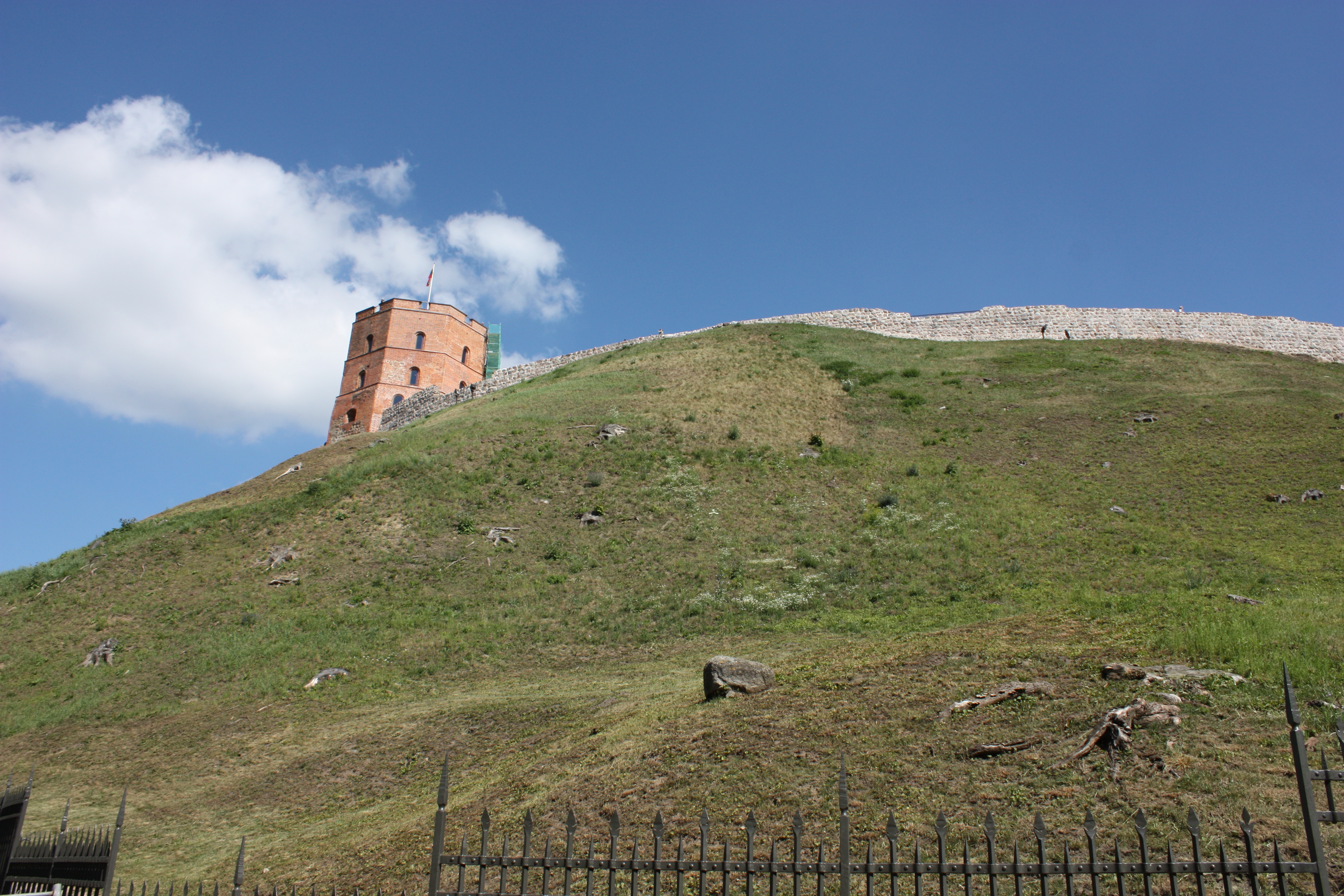
It’s a specific kind of authenticity visitors look for in a place like Vilnius, a way to feel life’s pleasure, excitement, and adventure—but not too much of it. Yesterday we saw some...conveyance go by at a distance, like a rolling bar with a roof, guys in funny hats sitting on it, drinking at counters down both sides. The crowd cheered, and it was gone. When we walked down by the cathedral later we found it parked there. It was a rented “velobaras,” pedal bar, built on an extended VW Bug chassis, all steel and lumber, bigger than my minivan at home and probably as heavy. In the middle of the two facing countertops, a barmaid pilled beer from a tap. Drinkers sat on bike seats, not stools, and had to pedal to move the thing, while a large man, forward of the barmaid, steered.

But as we walked aimlessly around Old Town we kept turning corners and encountering the velobaras lumbering along. Every time the crew begged us to join them, and at the base of the steepest hill in town they finally overcame our objections without own pride: They said they couldn’t do it without us. We helped pedal not only up the steepest hill but about a mile on, through all the tourists taking pictures and video, the look of heart attack on our faces and Coca-Cola cups filled with warm beer in our hands. The crew roared and laughed and made us prove we’d drunk all our beer, as they had, by waving our empty cups over our heads, but it turned out that meant we wanted more beer, so we had to stay until we finished that too. We finally had to sneak off through the crowd at a break near Town Hall. I wish the groom and his bride well.
Come on out to the Baltics. We’ll be here another week before flying Ukraine Air back through Kiev to Moscow, reversing how we came. You might want to find a different route.
